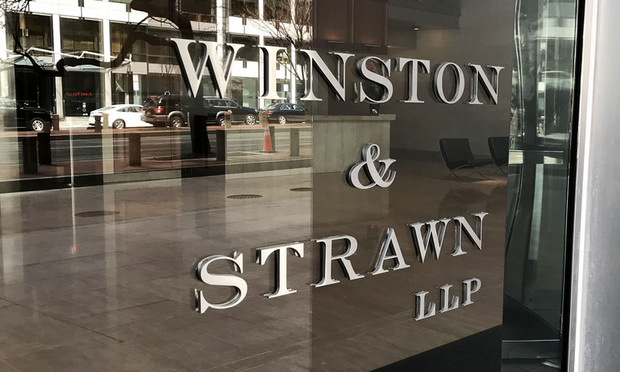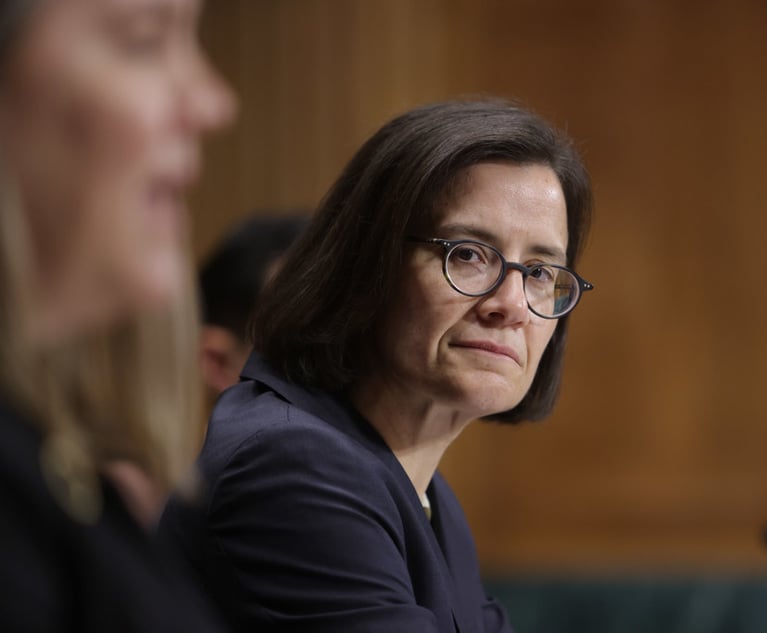Winston & Strawn Gets Big Law Backing at SCOTUS in Fight Over Arbitration with Ex-Partner
Ropes & Gray on Monday filed an amicus brief backing Winston & Strawn, in its fight at the U.S. Supreme Court to compel Constance Ramos, a former partner in California, to arbitrate claims of gender discrimination. The California Court of Appeal sided with Ramos in keeping the dispute in court.
June 17, 2019 at 04:57 PM
4 minute read
The original version of this story was published on National Law Journal
 Winston & Strawn sign.
Winston & Strawn sign.
Ropes & Gray on Monday became the first big law firm to weigh in on a case before the U.S. Supreme Court challenging a California court ruling that invalidated a former Winston & Strawn partner's employee-arbitration agreement.
Douglas Hallward-Driemeier, head of Ropes & Gray's appellate and Supreme Court practice, wrote in an amicus brief—filed in support of Winston & Strawn—that his firm's lawyers “handle highly confidential attorney-client privileged information and highly confidential business information every day. The California Court of Appeal's decision impedes the firm's ability to rely on confidential arbitrations to protect this sensitive information from public disclosure.”
Hallward-Driemeier was referring to Ramos v. Winston & Strawn, a 2018 decision by the California Court of Appeal that sided with Constance Ramos, an experienced litigator and patent practitioner who left the firm and sued claiming discrimination, retaliation, wrongful termination and anti-fair-pay practices.
Ramos alleged in her California state court complaint she was effectively forced out of Winston & Strawn. Her case is one of several in recent years filed by associates or partners alleging discriminatory employment practices against women at big law firms.
Winston & Strawn moved to compel arbitration, but the Court of Appeal, citing one of its own precedents from 2000, found the arbitration agreement “unconscionable.” The court, ruling in Ramos's favor last year, concluded provisions in the agreement requiring Ramos to pay her own legal fees and to share the cost of arbitration were both unlawful.
The firm took the case to the U.S. Supreme Court with a cert petition filed in May by E. Joshua Rosenkranz, co-head of the Supreme Court practice at Orrick, Herrington & Sutcliffe. The petition asserts that the California appeal court's ruling ignored the high court's 2011 decision in AT&T v. Concepcion, which solidified the force of arbitration agreements.
“The broader context is the California judiciary's persistent defiance of this court's clear rulings on arbitration,” Rosenkranz wrote in the brief.
The Ropes & Gray brief underscored the importance of arbitration agreements, especially at law firms.
“Today, it is common for law firms to experience regular fluctuations in their partnership ranks,” Hallward-Driemeier wrote. “As a result, it has become increasingly important for law firms to be able to quickly and efficiently resolve internal disputes in a way that protects confidential information and minimizes disruptions to client service.”
Hallward-Driemeier argued that “public litigation of disputes between law firm partners also carries the unique and ever-present risk of disclosing client secrets, which lawyers have a paramount ethical obligation to protect.” He added: “Confidential arbitration offers a means of shielding client and firm confidential information, and avoiding the immeasurable harm that may flow from public disputes—particularly disputes that center on specific client relationships, like the complaint that respondent filed here.”
Karla Ann Gilbride, senior attorney at Public Justice, is representing Ramos in the Supreme Court litigation.
Ropes & Gray's amicus brief is posted below:
Read more:
Facebook Lawyer Joins Bias Class Action Against Jones Day
Jones Day Presses Plaintiffs to Go Public in Gender Bias Case
Roberts Delivers Latest Pro-Arbitration Ruling for Divided Court
Writing Styles of Gorsuch and Kavanaugh Revealed in Arbitration Rulings
Sen. Whitehouse: There's a 'Crisis of Credibility' at the U.S. Supreme Court
This content has been archived. It is available through our partners, LexisNexis® and Bloomberg Law.
To view this content, please continue to their sites.
Not a Lexis Subscriber?
Subscribe Now
Not a Bloomberg Law Subscriber?
Subscribe Now
NOT FOR REPRINT
© 2025 ALM Global, LLC, All Rights Reserved. Request academic re-use from www.copyright.com. All other uses, submit a request to [email protected]. For more information visit Asset & Logo Licensing.
You Might Like
View All
‘Not A Kindergarten Teacher’: Judge Blasts Keller Postman, Jenner & Block, in Mass Arb Dispute
6 minute read

'Opaque and Unfair': 9th Circuit Rejects Live Nation's Rules for Mass Arbitrations
Trending Stories
- 1Uber Files RICO Suit Against Plaintiff-Side Firms Alleging Fraudulent Injury Claims
- 2The Law Firm Disrupted: Scrutinizing the Elephant More Than the Mouse
- 3Inherent Diminished Value Damages Unavailable to 3rd-Party Claimants, Court Says
- 4Pa. Defense Firm Sued by Client Over Ex-Eagles Player's $43.5M Med Mal Win
- 5Losses Mount at Morris Manning, but Departing Ex-Chair Stays Bullish About His Old Firm's Future
Who Got The Work
J. Brugh Lower of Gibbons has entered an appearance for industrial equipment supplier Devco Corporation in a pending trademark infringement lawsuit. The suit, accusing the defendant of selling knock-off Graco products, was filed Dec. 18 in New Jersey District Court by Rivkin Radler on behalf of Graco Inc. and Graco Minnesota. The case, assigned to U.S. District Judge Zahid N. Quraishi, is 3:24-cv-11294, Graco Inc. et al v. Devco Corporation.
Who Got The Work
Rebecca Maller-Stein and Kent A. Yalowitz of Arnold & Porter Kaye Scholer have entered their appearances for Hanaco Venture Capital and its executives, Lior Prosor and David Frankel, in a pending securities lawsuit. The action, filed on Dec. 24 in New York Southern District Court by Zell, Aron & Co. on behalf of Goldeneye Advisors, accuses the defendants of negligently and fraudulently managing the plaintiff's $1 million investment. The case, assigned to U.S. District Judge Vernon S. Broderick, is 1:24-cv-09918, Goldeneye Advisors, LLC v. Hanaco Venture Capital, Ltd. et al.
Who Got The Work
Attorneys from A&O Shearman has stepped in as defense counsel for Toronto-Dominion Bank and other defendants in a pending securities class action. The suit, filed Dec. 11 in New York Southern District Court by Bleichmar Fonti & Auld, accuses the defendants of concealing the bank's 'pervasive' deficiencies in regards to its compliance with the Bank Secrecy Act and the quality of its anti-money laundering controls. The case, assigned to U.S. District Judge Arun Subramanian, is 1:24-cv-09445, Gonzalez v. The Toronto-Dominion Bank et al.
Who Got The Work
Crown Castle International, a Pennsylvania company providing shared communications infrastructure, has turned to Luke D. Wolf of Gordon Rees Scully Mansukhani to fend off a pending breach-of-contract lawsuit. The court action, filed Nov. 25 in Michigan Eastern District Court by Hooper Hathaway PC on behalf of The Town Residences LLC, accuses Crown Castle of failing to transfer approximately $30,000 in utility payments from T-Mobile in breach of a roof-top lease and assignment agreement. The case, assigned to U.S. District Judge Susan K. Declercq, is 2:24-cv-13131, The Town Residences LLC v. T-Mobile US, Inc. et al.
Who Got The Work
Wilfred P. Coronato and Daniel M. Schwartz of McCarter & English have stepped in as defense counsel to Electrolux Home Products Inc. in a pending product liability lawsuit. The court action, filed Nov. 26 in New York Eastern District Court by Poulos Lopiccolo PC and Nagel Rice LLP on behalf of David Stern, alleges that the defendant's refrigerators’ drawers and shelving repeatedly break and fall apart within months after purchase. The case, assigned to U.S. District Judge Joan M. Azrack, is 2:24-cv-08204, Stern v. Electrolux Home Products, Inc.
Featured Firms
Law Offices of Gary Martin Hays & Associates, P.C.
(470) 294-1674
Law Offices of Mark E. Salomone
(857) 444-6468
Smith & Hassler
(713) 739-1250







